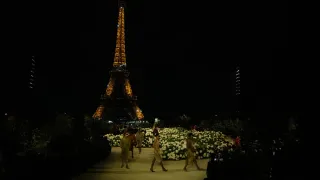
3 hours ago
J.K. Rowling Responds Publicly to Emma Watson’s Call for Dialogue
READ TIME: 3 MIN.
J.K. Rowling, the author of the "Harry Potter" series, and Emma Watson, who played Hermione Granger in the film adaptations, have maintained a complicated relationship in recent years. The tension stems largely from Rowling’s public statements on transgender rights, which have been widely criticized as transphobic by LGBTQ+ advocates, fans, and several Harry Potter cast members. Watson has previously voiced support for transgender people and distanced herself from Rowling’s remarks, stating that “trans people are who they say they are” and expressing solidarity with the transgender community on multiple occasions .
In a recent appearance on the "On Purpose with Jay Shetty" podcast, Watson addressed the ongoing controversy without directly naming Rowling, but made clear her desire for respectful dialogue. “I think it’s my deepest wish that I hope people who don’t agree with my opinion will love me and I hope I can keep loving people who I don’t necessarily share the same opinion with,” Watson stated. She also emphasized her continued appreciation for Rowling as a person, despite their differences, saying she will “treasure Jo and the person that I had personal experiences with” .
Watson’s comments were widely interpreted as an olive branch, suggesting a willingness to engage in honest conversation even amid strong disagreements on matters of gender identity and rights .
On September 29, Rowling responded with a lengthy post on X (formerly Twitter), addressing Watson’s remarks and reflecting on their relationship. Rowling publicly shared a handwritten note from Watson, which she claims “changed their relationship.” While some observers saw this as an attempt to connect, Rowling’s subsequent comments took a more confrontational tone. She declared, “I finally decided to exercise my right to disagree and discuss my feelings about Watson in public,” reiterating her long-standing opposition to certain aspects of transgender rights advocacy. Rowling characterized Watson’s perspective as “ignorant of how ignorant she is,” signaling little movement in her stance and expressing skepticism about the prospect of meaningful dialogue .
I'm seeing quite a bit of comment about this, so I want to make a couple of points.
I'm not owed eternal agreement from any actor who once played a character I created. The idea is as ludicrous as me checking with the boss I had when I was twenty-one for what opinions I should… https://t.co/c0pz19P7jc
— J.K. Rowling (@jk_rowling) September 29, 2025
Rowling’s response has prompted renewed concern among LGBTQ+ advocates and allies, many of whom view her statements as emblematic of persistent challenges to transgender rights in public discourse. Organizations such as Stonewall and GLAAD have previously condemned Rowling’s rhetoric, noting the harm such high-profile statements can cause to transgender people and the broader LGBTQ+ community . The public disagreement between Rowling and Watson has also reignited debate among Harry Potter fans, with many expressing support for Watson’s inclusive approach and affirming the importance of allyship in the entertainment industry .
The Rowling-Watson exchange underscores the evolving conversation about LGBTQ+ rights, especially transgender rights, within mainstream culture. Watson’s call for empathy and connection despite ideological divides has been praised by many as a model for respectful engagement. However, Rowling’s public rebuttal and characterization of Watson’s position as “ignorant” highlight the difficulties of bridging such divides, particularly when discussions involve deeply held beliefs about identity and rights .
Advocates stress the importance of centering transgender voices and experiences in conversations about rights and representation. Many within the community argue that public figures like Rowling have a responsibility to avoid rhetoric that may contribute to stigma or misinformation about transgender people. Watson’s approach, emphasizing love and understanding, has been cited as an example of allyship and the ongoing need for solidarity in the face of adversity .
As the debate continues, LGBTQ+ organizations have reiterated the importance of open, informed, and compassionate dialogue. They encourage those with large platforms to educate themselves about the lived experiences of transgender people and to use their influence to promote understanding and acceptance. The latest exchange between Rowling and Watson serves as a reminder of both the challenges and possibilities inherent in public conversations about LGBTQ+ rights.
For many, the hope remains that figures with influence—whether authors, actors, or public commentators—will ultimately choose empathy and inclusion, fostering a cultural climate where all identities are respected and affirmed.






